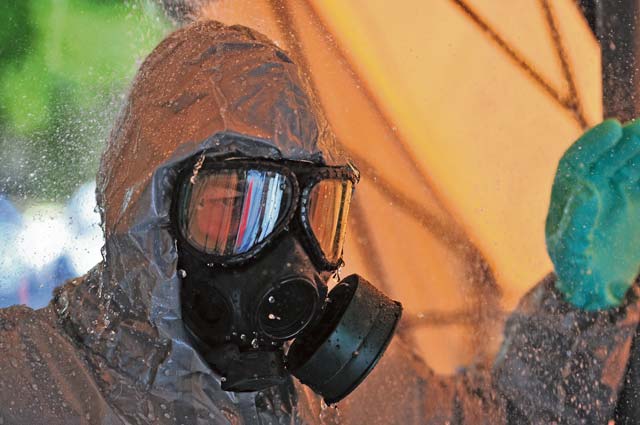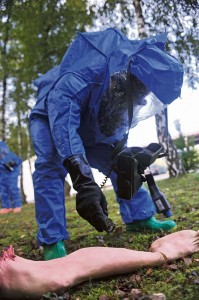
Soldiers from the 21st Theater Sustainment Command’s 7th Civil Support Command and 16th Sustainment Brigade conducted their first joint chemical, biological, radiological and nuclear and mortuary affairs training exercise Sept. 23 to 25 on Panzer Kaserne in Kaiserslautern.
The training featured Soldiers from the 21st TSC’s headquarters, the 16th SB’s headquarters and 18th Combat Sustainment Support Battalion, as well as personnel from the 7th CSC’s 773rd Civil Support Team. Their Soldiers’ military occupational specialties included mortuary affair specialists, CBRN specialists and medics. Trainees spent the first two days in a classroom training environment learning about the vital role each member of this team plays, said Cpl. Eric J. Song, a CBRN specialist assigned to the 773rd CST.

“This is my first time working with Soldiers from mortuary affairs, and before this training I really didn’t understand what they do,” Song said. “If there is an attack or incident that involves remains recovery in a contaminated environment, it is important that Soldiers like me know how to do this the right way.”
The third day of training began with members of the team transporting mobile decontamination tents, hazardous material protective suits, medical equipment and CBRN detection gear to a designated site in response to a simulated attack. The situation given was that a weapon of mass destruction had been detonated and may have contaminated an area. The CBRN Soldiers needed to identify possible contamination, evacuate survivors and recover any remains, said Sgt. 1st Class Erik C. Thomsen, the senior mortuary affairs specialist with the 21st TSC.
“The scenario we have given them is that there was an attack in Southwest Asia and we don’t know if it is chemical,” Thomsen said. “Our CBRN counterparts will go into the contaminated zone and bring back any remains. Then, myself and the mortuary affairs personnel will assist in decontaminating the remains and preparing them for transportation.”
The first CBRN team entered the simulated contamination zone to assess the chemical threat level and conduct a preliminary search for survivors and remains. A second team then entered and conducted a second search of the area. They labeled any remains, personal effects and survivors, then transported everything and everyone out of the contaminated zone.
Each team member went through a medical screening before and after their time in a contaminated environment, said Maj. Melissa J. Frauendorfer, a family nurse practitioner with the 773rd CST.
“We take readings on the Soldiers before they enter and when they return from a contaminated area because these readings can help us keep them safe and even help us identify possible contaminants,” Frauendorfer said.
As the training session ended, all Soldiers went through the mobile decontamination tent and began packing up their equipment. While the training was beneficial, Thomsen said it is the first session of several to come.
“This is the first time all of the U.S. Army Europe mortuary affairs personnel are teaming with CBRN assets to conduct this type of training,” Thomsen said. “In the future we will conduct training with other branches of service so we are all prepared to work together in the event of this kind of situation.”







